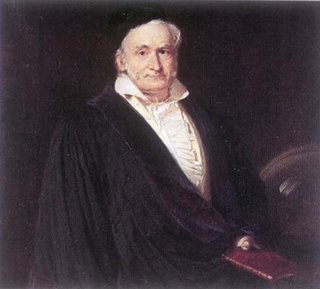 Carl Friedrich Gauss was born on April 17, 1777 to poor, working class parents in Brauschweig, Germany. His mother had been a maid and his father had been a laborer and handyman. His father, it is said, did not appreciate Gauss's abilities or his later accomplishments.
Carl Friedrich Gauss was born on April 17, 1777 to poor, working class parents in Brauschweig, Germany. His mother had been a maid and his father had been a laborer and handyman. His father, it is said, did not appreciate Gauss's abilities or his later accomplishments.Gauss is considered to be one of the three greatest mathematicians of all time. The other two being Archimedes and Sir Isaac Newton. His accomplishments are so vast that this blog will only be a brief glimpse. For those interested in greater details, please check out the reference list at the end of this blog.
Gauss showed indications of mathematical genius very early. According to a popular story, he noticed a mistake in his father's calculations when he was only 3 years old. Later, he supposedly taught himself to read and by the time he was 8, he was already astounding people by his mathematical abilities. For example, there is a well known anecdote where a teacher gave his students an assignment to add up a series of 100 numbers. Instantly, Gauss said that he had completed the exercise (the story goes that he had figured that 100 numbers could be determined by the equation n(a+b)(1/2)=50(a+b) where n=100, a = the first digit in the sequence and b = the last digit in the sequence.)
Gauss's teachers would lend him books and try to help him along with his independent studies of the subject. In 1788, at the age of 11, he entered the Gymnasium, a college preparatory school. In 1792, at the age of 14, he received a stipend from the Duke of Brunswick which made him financially independent for the next 16 years and it was that year that he entered Brunswick College.
He entered the University at Gottigen in 1795 and became famous in 1796 at the age of 19 with his discovery on March 30 of a method for constructing a heptadecagon (a regular 17-sided polygon) using only a compass and ruler. He was so excited by this that he requested that a heptadecagon be placed on his tombstone. For his doctoral thesis, he proved the fundamental theorem of algebra which states that all polynomials of degree n have n different solutions in the domain of complex numbers.
Gauss's other discoveries include the law of quadratic reciprocity, Gaussian distribution, modular arithmetic, non-Euclidean geometry, the prime number theorem, the systematization of number theory, and the method of least squares. Gauss worked on many of these discoveries completely on his own without any collaborators.
Gauss also had a strong interest in astronomy. In 1801, the planetoid Ceres was first sighted. Gauss studied data abouts its orbit and was able to predict a second possible sighting which was confirmed on December 31, 1801. In 1805, he became Director of the Observatory in Gottingen.
Despite his fame in mathematics, Gauss never became a mathematics professor and only attended one math conference. It was said that he strongly disliked teaching. When his good friend Farkas Bolyai told him that his son has come up with a non-Euclidean geometry, Gauss responded:
"To praise it would amount to praising myself. For the entire content of the work ... coincides almost exactly with my own meditations which have occupied my mind for the past thirty or thiry-five years."
Gauss's personal life was filled with tragedy. His first wife died in 1809 and a few years later, his first son died. It was said that throughout his life, he never overcame the sadness of this event. His second wife died in 1831 after a long illness. He never married after that. He died on February 23, 1855.
Gauss did not publish most of his discoveries. They were published after his death.
His face can be found on the German Deutche mark from 1989 until 2001:
References for this blog:

2 comments:
Gauss is one of those people that seem to belong to another planet. He is probably THE greatest mathematician of all times.
Laplace described Gauss as a "super-terrestrial spirit in a human body". Jacobi, a great mathematician who actually disliked Gauss, once said: "Mathematics would be in a very different position if practical astronomy had not diverted this colossal genius from his glorious career".
Gauss is one of those people that seem to belong to another planet. He is probably THE greatest mathematician of all times.
Laplace described Gauss as a "super-terrestrial spirit in a human body". Jacobi, a great mathematician who actually disliked Gauss, once said: "Mathematics would be in a very different position if practical astronomy had not diverted this colossal genius from his glorious career".
Post a Comment